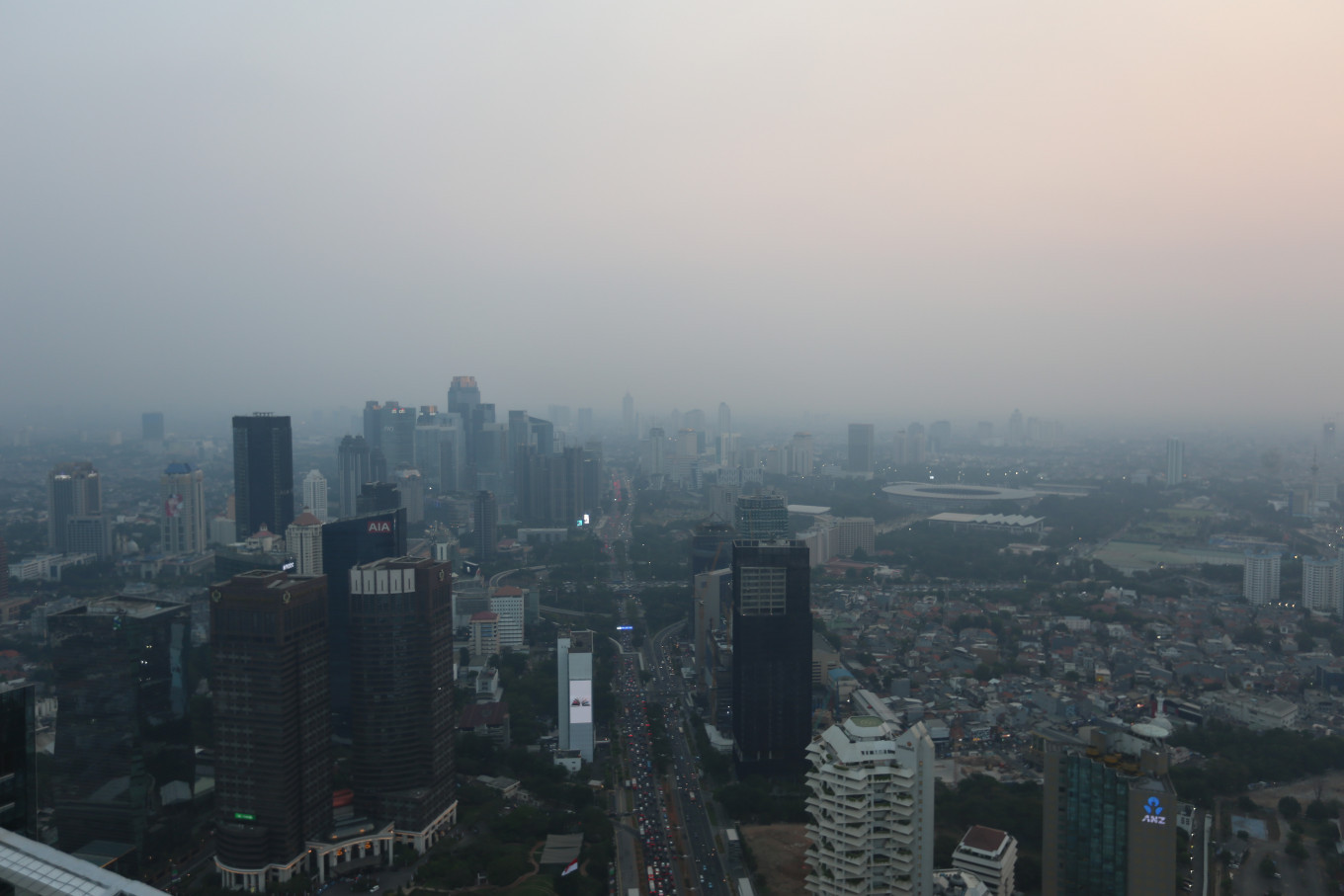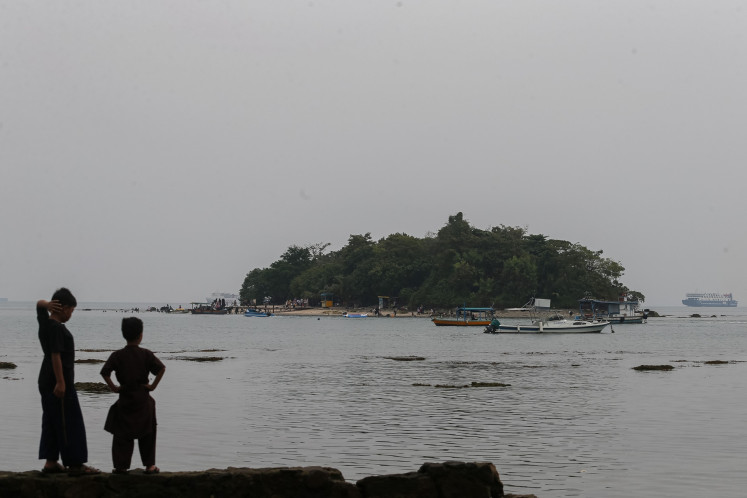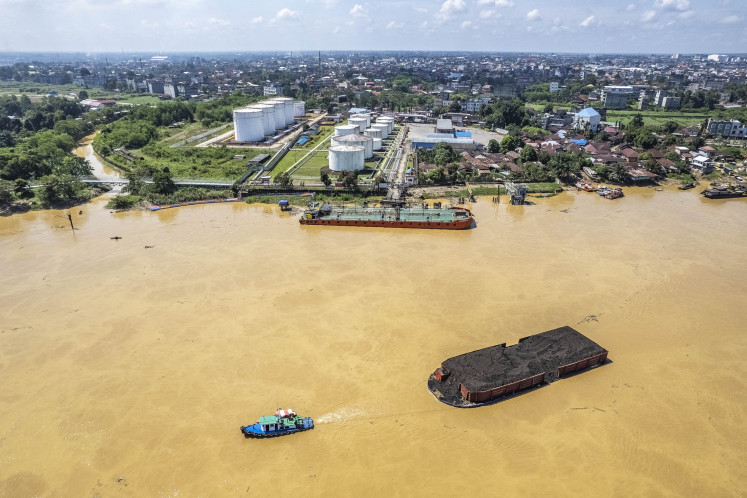Popular Reads
Top Results
Can't find what you're looking for?
View all search resultsPopular Reads
Top Results
Can't find what you're looking for?
View all search resultsWhy we need to act now for Jakarta’s population health
Even with the COVID-19 lockdown reducing air pollution globally, Jakarta’s air stayed as polluted as ever.
Change text size
Gift Premium Articles
to Anyone

O
n Sept. 16 Jakarta citizens won the right to breathe clean and healthy air. On that day, the Central Jakarta District Court ruled the government was liable for air pollution and had failed to ensure a healthy living environment in the city.
This civil lawsuit, filed by 32 Jakarta citizens against President Joko “Jokowi” Widodo, three ministers and the three governors of Jakarta, Banten and West Java, took two years to complete. During that lengthy process, Jakarta citizens kept breathing air containing high levels of hazardous pollutants. The government thus has no excuse not to act now.
The court has instructed the defendants to improve the national air quality standard to protect the environment, the ecosystem and humans’ health, including the health of sensitive populations. It has further ordered Jakarta, Banten and West Java provincial administrations to control the interprovincial emissions better.
The landmark decision came after so many delays due to several reasons, including the COVID-19 pandemic. Now execution of the court ruling may face a delay if the defendants appeal – and they will.
From the population’s health perspective, however, we must not postpone actions in compliance with the court ruling for several reasons.
First, air pollution affects a much wider range of health conditions. Adverse health effects from short- and long-term air pollution exposure range from premature deaths caused by lung and heart disease to severe asthmatic conditions, which could lead to reduced life span and quality of life.
Jakarta, home to more than 10 million people, consistently ranks as one of the most polluted cities in the world.
The current PM2.5 concentration in Jakarta air is four times the World Health Organization’s annual air quality guideline value. The emissions from transportation, households, manufacturing, construction, open burning and emissions from numerous coal-fired power plants have created the perfect storm of pollutants in the city. Even with COVID-19 lockdown reducing air pollution globally, Jakarta’s air stayed as polluted as ever.
A recent study shows that compared with the PM10 concentration in the pre-large-scale social restrictions (PPKM) period, the PM10 in Jakarta increased by 10.9 percent in the PPKM period.
Greenpeace estimated that PM2.5 air pollution was behind 10,000 deaths in Jakarta since the beginning of 2021, and that number keeps increasing every day. Greenpeace calculated that the air pollution has cost the capital approximately US$3.4 billion. More significant steps need to be taken immediately to address this problem.
Among the pollutants, the health effects of particulate matter (PM) are more significant. It comprises a mixture of microscopic solids and liquid droplets, including nitrates, ammonium, sodium chloride, carbon, sulfate and mineral dust, suspended in the air. PM10 refers to inhalable particles with a diameter that is generally 10μm or smaller, while PM2.5 are fine particles with a diameter of 2.5μm or smaller.
Particles, smaller than 10μm, can penetrate deeply into our lungs and even get into the bloodstream. They can irritate and corrode the alveolar wall and in consequence damage the function of the lung. Smaller particles, especially less than 2.5μm, pose the greatest health risk. Chronic exposure to those particles contributes to the risk of developing cardiovascular diseases and lung cancer.
A 2016 study revealed that a daily increase of PM2.5 by 10 µg/m3 is related to a 2.07 percent increase in respiratory disease prevalence and an 8 percent of hospitalization rate. Mortality due to respiratory diseases increased by 0.58 percent for every 10 µg/m3 increase of PM10. CREA estimates 1,430 respiratory and cardiovascular deaths annually in Jakarta and surroundings are due to the high PM2.5 concentration.
Second, tackling air pollution is crucial to saving the next generation. The “fetal origins” hypothesis states that the in-utero period determines mortality outcomes, disease prevalence and future health outcomes for a child. Restricted fetal growth can negatively affect children’s abilities, academic performance and earnings. Air pollution affects fetal development through placental growth and determines the supply of oxygen and nutrients.
Another study in 2017 revealed that pollution reduction leads to lower infant mortality, higher birth weight and fewer reported asthma cases, neuro-developmental disorders and premature births. CREA found that Greater Jakarta in 2020 had 718 pre-term births and 3,180 new cases of asthma in children annually due to air pollution.
Furthermore, a study of 392 schoolchildren from 25 elementary schools in Jakarta found that the incidence rates of sore throats, coughing, phlegm and nasal infections were between 4.9 and 12.2 percent. Urgent implementation of the court ruling is needed to protect children from toxic air before irreversible damage to their health and their futures.
On top of those reasons, tackling air pollution in Jakarta should be prioritized to reduce the impact of COVID-19. Researchers agree that air pollution is one of the contributing factors to the COVID-19 pandemic. Exposure to air pollution can weaken the immune response, consequently facilitating viral penetration and replication.
Additionally, air pollutants are more likely to support viral persistence in the air and reduce vitamin D synthesis. Therefore, breathing in polluted air may increase the risk of severe outcomes of COVID-19, including hospitalization and death. Air pollution may also heighten the burden of people with long COVID-19. As their lungs are weakened by COVID-19 infection, they have difficulties breathing and getting oxygen to the bloodstream, leading to long-term breathlessness and poor ability to carry out daily tasks.
Breathing should not be deadly and polluted air is a manageable problem.
People’s health should be the main interest of all parties. We thus urge the government to follow the court ruling now and focus on improving air conditions instead of doing useless things such as challenging the ruling.
***
The writer is a researcher at the Faculty of Biology, Medicine and Health, University of Manchester, UK.









